Edie Melson's Blog, page 13
June 3, 2025
Six “Soft Skills” To Make You a Better Writer

by Sarah Sally Hamer @SarahSallyHamer
When we think about the skills it takes to be a better writer, we usually think of characterization or structure or word choices. But writing is not just about what we write on the page, it’s about a depth of understanding that a reader can resonate with. Honestly, anyone can write a book – it just takes putting words on paper in some way or another. But a book that people WANT to read? It takes a lot more than just words. Here are some skills I recommend, not only for writing, but ones we could use in almost any situation of human interaction.
Become a Better Writer by Mastering These Six Skills
1. Emotional Intelligence (EQ)
Every reader, just like anyone else on the planet, has particular tastes. We all have books we like and don’t like. Writers simply are not going to check off every box. But we have our own personal level of understanding, and writing, what matters to us. Love, hate, grief, happiness: we all have our own style of putting the words we write into a particular order. But being able to communicate with readers, to tell stories that echo through generations and cultures, to find people who care about the same things we do, is like finding buried treasure. Why do so many people still read Jane Austin’s books? Because she deftly explains the situation many women of her time (early 1800s) faced, where life choices really made a difference. We have multiple options in this century but, back then, marriage could make the difference between an easy or a hard life. Austin’s deep understanding, and the personal choices she made, give the reader a view into despair, heartache, scandal, and, ultimately, the future of a culture that depended on the fact that, “It is a truth universally acknowledged, that a single man in possession of a good fortune, must be in want of a wife.” And all of her books are wrapped around that piece of emotional intelligence.
2. Adaptability
Styles change. The way we write changes. Publishing changes (probably more in the last fifty years than in the last five hundred years). What we write about changes. That doesn’t mean that Tolkien’s or Herbert’s stories and, of course, even Beowulf, won’t be retold in thousands of versions. Good structure is good structure. But we MUST adapt to the changes in the story-telling world. This does not mean that we give up our voices to the crazy whims of each new idea, but it does mean that we should, and can, adapt in the ways that stories are presented to each new generation.
3. Communication Skills
Writing IS communication. Whether it’s with readers or publishing professionals (editors, agents, other writers, etc.), being able to understand the conversation, sometimes at several levels, can make the difference between success and failure. Honing our skills and learning both to talk and to listen, may open doors or keep them from closing.
4. Time Management
Don’t let the time bandits steal your productivity. This doesn’t mean that you need a calendar with every minute scheduled, but to be aware of where your time goes. We can get a lot done in a small amount of time if we allow ourselves to focus on the important things. Also, consider examining your commitments. Are you over booking? (Literally?) Saying “no” may lose an opportunity, but it can also help your sanity.
5. Creativity
Where does your creativity come from? Do you feed that source? Or do you drain your creativity cup, day by day, until there’s nothing left? How can you both replenish and renew creativity? You’re the only one who knows. And, finding that peace within you to make it happen could be the most important thing you do. May I suggest you start looking? Because readers will recognize that empty cup. They know when we have exhausted our store.
6. Resilience
Similar to adaptation, resilience is the ability to bounce back from any turmoil or upset. It’s part determination and part stubbornness. Finding the way back from something that looks like failure isn’t always easy. But, sometimes, it’s those “unanswered prayers” that lead us to a better place. So, keeping on keeping on allows us to find what we really wanted and needed in our lives.
Bottom line, our writing reflects our level of personal honesty. Writing the words is easy. It’s writing the humanity and the understanding of how we all work with each other that truly makes the difference, both in our writing and in our own lives.
Which of the skills do you think is most important? Which one will you tackle first?
TWEETABLESix “Soft Skills” To Make You a Better Writer from @SarahSallyHamer on @EdieMelson (Click to Tweet)
 Sarah (Sally) Hamer, B.S., MLA, is a lover of books, a teacher of writers, and a believer in a good story. Most of all, she is eternally fascinated by people and how they 'tick'. She’s passionate about helping people tell their own stories and has won awards at both local and national levels, including two Golden Heart finals.
Sarah (Sally) Hamer, B.S., MLA, is a lover of books, a teacher of writers, and a believer in a good story. Most of all, she is eternally fascinated by people and how they 'tick'. She’s passionate about helping people tell their own stories and has won awards at both local and national levels, including two Golden Heart finals.A teacher of memoir, beginning and advanced creative fiction writing, and screenwriting at Louisiana State University in Shreveport for over twenty years, she also teaches online for Margie Lawson at www.margielawson.com and for the No Stress Writing Academy at https://www.worldanvil.com/w/classes-.... Sally is a free-lance editor and book coach, with many of her students and clients becoming successful, award-winning authors.
You can find her at info@mindpotential.org
Published on June 03, 2025 22:00
June 2, 2025
Be All-Seeing By Writing Third Person Omniscient

by PeggySue Wells @PeggySueWells
The Third Person Omniscient POV is told from a narrator who is all-knowing while not involved.
The cult classic, The Princess Bride, is a brilliant example of a tale told in Third Person Omniscient POV. The narrator, the grandfather, knows the actions, feelings, history, motivation, and thoughts of all the characters. Additionally, the narrator is privy to secret events and is not limited by space or time.
Writing in Third Person Omniscient POV, the narrator shares freely about everyone and everything in the story. The narrator is not limited by space, time, or view to know anything about the workings of the tale.
To keep the reader intensely interested in the story, the narrator strategically drips for greatest effect, the information and knowledge about each character in a fashion that heightens the suspense. By not dumping all the information, the narrator compels the reader to keep turning pages.
Chasing Sunrise
In Chasing Sunrise , this scene is presented in Third Person Omniscient POV.
Before the man was secure, he pulled a knife that had been hidden in his clothing. With a sudden thrust, he deeply pierced Corbin’s groin. Michael heard Corbin cry out and saw a burst of blood spurt and spurt again. In a flash, Bryce came like a freight train at the assailant, and the two rolled and tumbled away from Corbin followed by a sickening sound of angry fists thudding against flesh.
Corbin dropped to the ground as blood poured from his leg wound. Michael grasped the horrible truth. The knife had severed Corbin’s femoral artery. In minutes, his friend would bleed to death.
While Corbin writhed in agony, Michael reached for his dive knife. Grasping the handle, Michael sat on Corbin’s wounded leg. Holding the leg still, he cursed as he quickly sliced through the flesh to enlarge the wound.
“Holy Mother of Moses!” Jerry dropped down next to Michael. “What are you …?”
Ignoring Corbin’s anguished cry, Michael stuck his fist inside the man’s thigh. The artery spurted his friend’s lifeblood like water through a garden hose. Gritting his teeth in concentration, Michael grasped the artery in his fist and squeezed with all his strength.
Third Person Omniscient POV Titles
Books in Third Person Omniscient POV are The Lion, The Witch, and The Wardrobe by C.S. Lewis Dune by Frank L. Herbert Shawshank Redemption by Stephen King Bear Town by Fredrick Backman Lord of the Flies by William Golding
To tell a tale without being involved, use Third Person Omniscient. This POV allows the narrator to know all the details from a distance without being personally immersed.
TWEETABLEBe All-Seeing By Writing Third Person Omniscient from @PeggySueWells on @EdieMelson (Click to Tweet)
 PeggySue Wells is the award-winning USA Today and Wall Street Journal bestselling author of 45 books including the mystery suspense title of the year, Unnatural Cause.
PeggySue Wells is the award-winning USA Today and Wall Street Journal bestselling author of 45 books including the mystery suspense title of the year, Unnatural Cause. Action and adventure, romantic suspense, military romance, and cozy mystery are the page-turning novels by P.S. Wells including Chasing Sunrise, Homeless for the Holidays, and The Patent. How to live better, easier, and simpler is the focus of her nonfiction including The Ten Best Decisions A Single Mom Can Make.
PeggySue is a frequent guest with media including Focus On The Family, Family Life Today, and Christian Product Expo. She regularly teaches at conferences including Write To Publish, Taylor University Writers Conference, Kentucky Christian Writers Conference, and the Advanced Writers and Speakers Association. Collaborator on multiple titles including books with Dr. Benjamin Hardy, Shemane Nugent, Pat Palau, and Pam Farrel, PeggySue is a writing coach. When not writing, she parasails, skydives, snorkels, scuba dives, rides horses, and has taken (but not passed) pilot training. Founder of SingleMomCircle.com, connect with PS Wells at WWW.PEGGYSUEWELLS.COM, on Facebook at PeggySue Wells, and LinkedIn at LINKEDIN.COM/IN/PEGGYSUEWELLS
Published on June 02, 2025 22:00
June 1, 2025
F.O.C.U.S. Tips for Writers
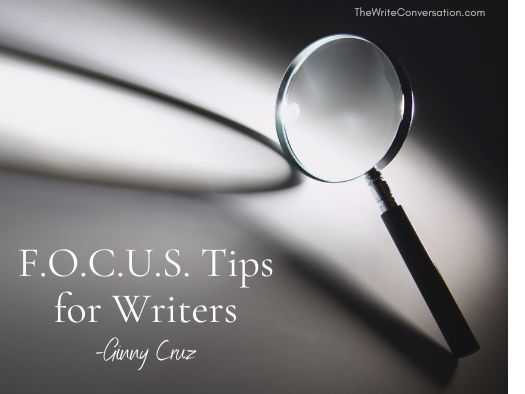
by Ginny Cruz, MPA, PT
Are you one of those writers with a word that guides your year? I am and have been doing so since God called me to write. Each December, I pray for a word and a Scripture verse to guide my focus. I must admit that the word He gives is not always welcome, such as my 2020 word, “train.” I knew that word meant a year of training. And boy, was it! You recall what 2020 was like, don’t you?
For 2025, God gave me the word “focus” and the verse, “We must focus on Jesus, the source and goal of our faith...” Hebrews 12:2 (GW). He knew my eyes often looked around at all the things to busy myself with, such as errands, chores, or anything other than sitting quietly with my eyes only on Him. If you are a person of action like me and become impatient while waiting, here are some tips He’s taught me that improve my focus.
Tips for Writers to Improve F.O.C.U.S.
F - FIXATE means to “focus almost obsessive attention on something" or “direct one’s gaze on something.” The NIV version of my 2025 verse reads, “Let us fix our eyes on Jesus, the author and perfecter of our faith, who for the joy set before him endured the cross, scorning its shame, and sat down at the right hand of the throne of God.” Wow! Isn’t that a powerful reminder to hold our eyes steadily upon the face of Jesus, no matter the circumstances, pain, or strife surrounding us? Do not look around at the crumbled papers on the floor and think yourself a failure; gaze constantly at Jesus and press on with your writing.
O - ON is an often overlooked yet powerful word meaning "physically in contact with" or "continuation of an action or movement." As a physical therapist, I understand the physical world and the importance of movement to people. When we strive to stay in contact with Jesus and continue moving toward Him in our calling, it is easier to continue writing when it becomes difficult, and it will. Staying grounded upon our Rock provides the firm surface we need to move forward.
C - CHRIST. He is the reason I write. My desire is to please Him, yet I frequently fall into a pit of quicksand by comparing my audience and body of work with others. Pleading forgiveness for this sin of comparison has led me to recall all He sacrificed for me. He never once expressed that dying for one person, me, was not reason enough. He endured unimaginable pain and public disgrace because His eyes saw me. If Christ could do that, then I can write for one person even if the world cares not.
U - UNTIL means “up to the point in time or the event mentioned.” In other words, it means waiting, and I don't like to wait. I'm a person of action, movement, and results. Knowing where I’m going or what my goal is, such as walking three miles, makes it easier to train and do the work needed to meet the goal. However, writing has been a more challenging path to figure out. What is the goal? How does one measure achievement? How does one establish a plan to meet an unclear goal? In Hebrews 11:8 NIV, we are reminded, "By faith, Abraham, when called to go to a place he would later receive as his inheritance, obeyed and went, even though he did not know where he was going.” When we focus on Jesus, we write in faith until He reveals our destination.
S - SATISFIED comes to mind. We write to satisfy the desire He has placed in our hearts. When we focus our words on satisfying Jesus, it becomes easier to write in faith until He reveals the audience and purpose of each piece. My curiosity about whether anyone is helped by the words I’ve written is often not satisfied. Yet, my need to complete goals and move toward His destination keeps me writing even when it is unclear where I am on the map of my journey.
When your eyes shift to other things, remember to Fixate On Christ Until Satisfied. Wherever you are on your journey, focus on Jesus regularly and be still in His presence. Do not look around at what needs doing, who is doing what, and what awards others have won. Look only at Him and go where He leads, no matter how long it takes. Focus, focus, focus on Christ until both of you are satisfied. And do it over and over as needed.
When you lose focus and become discouraged, what Scriptures do you lean on that satisfy your soul?
TWEETABLEF.O.C.U.S. Tips for Writers from Ginny Cruz on @EdieMelson (Click to Tweet)
 Ginny Cruz, MPA, PT is a pediatric physical therapist, early intervention specialist, and award-winning author. Her writing encourages and teaches moms simple and effective ways to help their baby meet developmental milestones. In addition to writing, she enjoys hiking, reading, and camping with her husband. Find out more at ginnycruz.com, Instagram, or Facebook.
Ginny Cruz, MPA, PT is a pediatric physical therapist, early intervention specialist, and award-winning author. Her writing encourages and teaches moms simple and effective ways to help their baby meet developmental milestones. In addition to writing, she enjoys hiking, reading, and camping with her husband. Find out more at ginnycruz.com, Instagram, or Facebook.
Published on June 01, 2025 22:00
May 31, 2025
Spiritual Practices for Writers: The Practice of Perseverance
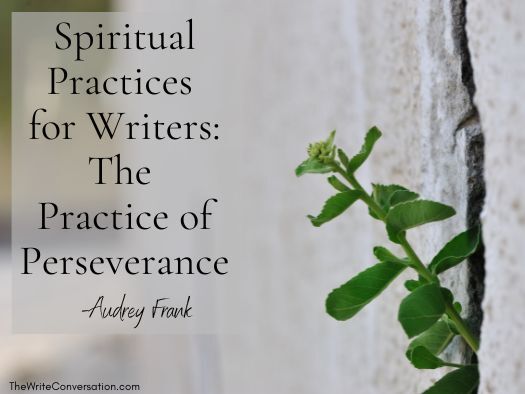
by Audrey Frank @AudreyCFrank
Therefore, since we have this ministry, just as God has shown us mercy, we do not become discouraged (2 Corinthians 4:1, NET).
I learned the practice of perseverance on my great-grandmother’s farm. Summer cherry-picking was an elaborate cousin operation. Year after year, I begged to be part of the scheme, but as the youngest and scrawniest, I was not considered essential to either the picking or the reward.
I never gave up. When I knew my cousins were in sight, I’d scramble up the nearest cherry tree to show off my climbing skills. Sometimes I’d linger in the branches until the cousin ring-leader traipsed underneath, and conveniently drop a cherry pit at his feet. (There’s a finesse to perseverance—I was discerning enough not to drop the pit on his head, which would have foiled my attempt to become part of the cherry-picking gang.)
One day, as I pretended not to notice they were gathering the buckets, I heard my name. And just like that, I was in.
I had finally won them over. The oldest and strongest cousin served as a human ladder as I climbed over him and up the tree. I didn’t think it wise to remind him I could do it without his help. I clamored across the branches and picked every ripe berry I could find, while the most mature and responsible cousin stood below, holding the bucket up high to collect. Afterwards, we gorged ourselves with fresh, sweet fruit.
There was not enough left for pie.
It’s one thing to cherry-pick cherries—quite another to cherry-pick Scripture.
For example, if we picked the phrase “we do not become discouraged” from 2 Corinthians 4:1, you’d stop reading now, and I’d lose any credibility as an encourager of writers.
Perhaps the cynical among us might quip,
As writers, we do become discouraged. Often.
But let’s leave cherry-picking to cherry trees and cousins on summer vacation.
In seminary, we were drilled to always consider Scripture in context. To understand the full picture of we do not become discouraged, we must first explore what came before the word therefore in 2 Corinthians 4:1.
Now the Lord is the Spirit, and where the Spirit of the Lord is present, there is freedom. And we all, with unveiled faces reflecting the glory of the Lord, are being transformed into the same image from one degree of glory to another, which is from the Lord, who is the Spirit (2 Corinthians 3:17-18).
Therefore, since we have this ministry, just as God has shown us mercy, we do not become discouraged (2 Corinthians 4:1).
This ministry makes “therefore” and everything after it possible. Including, and especially, the practice of perseverance.
This ministry we Christian writers have is not actually our own, nor does it originate with us. It is the ministry of the Spirit, and it comes from the Lord. It is specifically a ministry of transformation.
Think on that a moment.
Now the Lord is the Spirit, and where the Spirit of the Lord is present, there is freedom (2 Corinthians 3:17).
Writers, we can be free. Free to be transformed by the Spirit. Liberated by the knowledge that the Spirit of the Lord will do this work in and through us. Free from discouragement.
The word transformed is the Greek word metamorphoō, meaning to change form.
The Christian writing journey should be marked by continual transformation. Transformation involves conflict and change, discomfort and disorientation. It includes joy and elation, hope and faith.
The journey might not look glorious to the one laboring with her pen day after day. Perseverance is work. It’s staying the course through conflict, rising after rejection, and trusting the work of transformation through trial.
God is the agent in our writing ministry. We are the object. As He acts in us and through us, the words that flow from us will carry that transforming power to the world.
The practice of perseverance is really a practice of perspective.
We have this ministry, and it came from the Lord. It is accomplished by His Spirit. Writing is how we give it to the world.
Persevere, dear writer. The world needs transformation.
Lord, I get discouraged when I think I’m the agent of this word-ministry. Forgive me, and help me see day after day that it is Your Spirit working in me. Amen.
TWEETABLESpiritual Practices for Writers: The Practice of Perseverance from @AudreyCFrank on @EdieMelson (Click to Tweet)
Don't Miss The Other Spiritual Practices for Writers! JANUARY: THE PRACTICE OF PLANNING
FEBRUARY: THE PRACTICE OF TRUSTING
MARCH: THE PRACTICE OF HOPING
APRIL: THE PRACTICE OF WAITING
MAY: THE PRACTICE OF DISCIPLINE
JUNE: THE PRACTICE OF PERSEVERANCE
 Audrey Frank is an author, speaker, and storyteller. The stories she shares are brave and true. They give voice to those whose words are silenced by shame, the hard things in life that don’t make sense, and the losses that leave us wondering if we will survive. Audrey and her family have spent over twenty years living and working among different cultures and world views, and she has found that God’s story of redemption spans every geography and culture. He is the God of Instead, giving honor instead of shame, gladness instead of mourning, hope instead of despair. Although she has three different degrees in communication and intercultural studies, Audrey’s greatest credential is that she is known and loved by the One who made her.
Audrey Frank is an author, speaker, and storyteller. The stories she shares are brave and true. They give voice to those whose words are silenced by shame, the hard things in life that don’t make sense, and the losses that leave us wondering if we will survive. Audrey and her family have spent over twenty years living and working among different cultures and world views, and she has found that God’s story of redemption spans every geography and culture. He is the God of Instead, giving honor instead of shame, gladness instead of mourning, hope instead of despair. Although she has three different degrees in communication and intercultural studies, Audrey’s greatest credential is that she is known and loved by the One who made her.Audrey is the author of Covered Glory: The Face of Honor and Shame in the Muslim World (Harvest House Publishers), an outpouring of Audrey’s heart to introduce others to the God of Instead. Shame is not unique to the developing world, the plight of the women behind veils, young girls trafficked across borders; shame is lurking in hearts everywhere. Through powerful stories from women around the world, Covered Glory illuminates the power of the Gospel to remove shame, giving honor instead. Available at favorite booksellers: BARNES & NOBLE, BOOKS A MILLION, AMAZON.
Published on May 31, 2025 22:00
May 30, 2025
June Inspiration for Writing Social Media Posts, Articles, and Blog Posts

by Edie Melson @EdieMelson
May is almost over so let’s get a jump start for May writing ideas. The calendar is a great place to start when we’re looking for writing ideas. Crazy (and even legit) holidays are great conversation starters for social media sites, articles, and blogging. This month is especially fun for writers because of all the writing/reading related holidays. How many can you find? Be sure to leave your thoughts in the comment section at the end of the post.
The Month of June IsNational Portuguese Heritage MonthNational Migraine Awareness MonthNational PTSD Awareness MonthNational Home Ownership MonthNational Give a Bunch of Balloons MonthNational Pollinators MonthNational DJ MonthNational Safety MonthMen's Health MonthAfrican-American Music Appreciation MonthNational Soul Food MonthNational Papaya MonthNational Iced Tea MonthNational Great Outdoors MonthNational Dairy MonthNational Country Cooking MonthNational Camping MonthNational Candy MonthFresh Fruit and Vegetable MonthNational Adopt a Cat MonthTurkey Lovers MonthNational Rose MonthZoo and Aquarium Month
June Special WeeksNational Flag Football Week (First Full Week in June)Community Health Improvement Week (First Full Week in June)Bed Bugs Awareness Week (First Full Week in June)National Gardening Week (First Full Week of June)International Clothesline Week (Begins First Saturday in June)National CPR and AED Awareness Week (Jun 1 - 7)National Fishing and Boating Week (Begins First Full Weekend of June)Canadian Environment Week (Week of June 5)Nursing Assistants Week (Begins Thursday of Second Full Week)Right of Way Professionals Week (Second Full Week of June)National Little League Week (Second Week of June)National Flag Week (Week of June 14)National Play Catch Week (third Full Week in June)Men's Health Week (Week before Father's Day)Waste and Recycling Workers Week (Week of June 17)Animal Rights Awareness Week (Third Week in June)Universal Father's Week (Third Week in June)National Lighting Safety Awareness Week (Last Full Week in June)Wildland Firefighter Week of Remembrance (June 30 - July 6)
June Special DaysJune 1National Game Show DayNational Nail Polish DayNational Olive Daynational Hazelnut Cake DayNational Pen Pal DayNational Say Something Nice DayNational Go Barefoot DayNational Heimlich Maneuver DayNational Cancer Survivor's Day (First Sunday in June)
June 2International Volkswagen Bus DayNational Rotisserie Chicken DayNational Bubba DayNational Rocky Road DayNational Leave the Office Early Day
June 3National Egg DayNational Chocolate Macaroon DayNational Repeat DayNational Repeat Day
June 4National Hug Your Cat DayNational Clean Beauty DayNational Safe DayNational Cheese DayNational Old Maids Day
June 5National Ketchup DayNational Start Over DayNational Veggie Burger DayNational Gingerbread DayNational Moonshine Day
June 6D-DayNational Eyewear DayNational Higher Education DayNational Applesauce Cake DayNational Dive-In Movie DayNational Yo-Yo DayNational Gardening Exercise DayNational Doughnut Day (First Friday in June)
June 7National Chocolate ice Cream DayWorld Caring DayNational Oklahoma DayNational VCR DayNational Boone DayNational Black Bear Day (First Saturday in June)National Bubbly Day (First Saturday in June)National Prairie Day (First Saturday in June)National Trails Day (First Saturday in June)National Play Outside Day (First Saturday of Every Month)
June 8National Upsy Daisy DayNational Name Your Poison DayNational Best Friends DayChildren's Day (Second Sunday in June)
June 9National Earl DayNational Strawberry Rhubarb Pie DayNational Donald Duck Day
June 10National Frosted Cookie DayNational Egg Roll DayNational Herbs and Spices DayNational Black Cow DayNational Iced Tea DayNational Ballpoint Pen DayNational Forklift Safety Day (Second Tuesday in June)National Call Your Doctor Day (Second Tuesday in June)
June 11National Making Life Beautiful DayNational German Chocolate Cake DayNational Corn on the Cob Day
June 12National Peanut Butter Cookie DayNational Jerky DayNational Loving DayNational Red Rose Day
June 13National Golf Cart DayNational Random Acts of Light DayNational Kitchen Klutzes of America DayNational Weed Your Garden DayNational Sewing Machine DayNational Blame Someone Else Day (First Friday the 13th of the Year)National Movie Night (Second Friday in June)Wear Blue Day (Friday Before Father's Day)
June 14National Cucumber DayNational New Mexico DayArmy BirthdayNational Strawberry Shortcake Daynational Pop Goes the Weasel DayNational Flag DayNational Dragonfly Day (Second Saturday in June)National Outlet Shopping Day (Second Saturday in June)
June 15National Big Boy DayNational Foam Party DayNational Megaladon DayNature Photography DayNational Smile Power DayNational Turkey Lovers' Day (Third Sunday in June)Father's Day (Third Sunday in June)
June 16National Fudge Day
June 17National Mascot DayNational Cherry Tart DayNational Apple Strudel DayNational Eat Your Vegetables DayNational Root Beer Day
June 18National Wanna Get Away DayNational Splurge DayNational Go Fishing Day
June 19World Sauntering DayJuneteenthNational Watch DayNational Free BSD DayNational Garfield the Cat Day
June 20National Hike with a Geek DayNational Ice Cream Soda DayNational Vanilla Milkshake DayNational American Eagle DayNational Take Your Dog to Work Day (Friday after Father's Day)National Seashell Day (First Day of Summer)
June 21National Wagyu DayNational Smoothie DayNational Arizona DayNational Day of the GongNational Selfie DayGo Skateboarding DayNational Daylight Appreciation DayNational Peaches 'N' Cream DaySummersgiving (Saturday after the Summer Solstice)
June 22International Being You DayNational Kissing DayNational HVAC Tech DayNational Onion Rings DayNational Chocolate Eclair Day
June 23National Detroit-Style Pizza DayNational Hydration DayNational Pecan Sandies Daynational Pink Day
June 24National Patch DayNational Take Back the Lunch Break DayNational Pralines DayNational Parchment Day (Last Wednesday in June)
June 25National strawberry Parfait DayNational Leon DayNational Catfish Day
June 26National Barcode Daynational Coconut DayNational Chocolate Pudding Day National Beautician's DayNational Handshake Day (Last Thursday in June)National Bombe Pop Day (Last Thursday in June)
June 27National Sunglasses DayNational Onion DayNational Ice Cream Cake DayNational PTSD Awareness DayNational Orange Blossom Day
June 28National Foodie DayNational Logistics DayNational Alaska DayNational Insurance Awareness DayNational Paul Bunyan DayNational Mural Day (Last Saturday in June)
June 29National Almond Buttercrunch DayNational Waffle Iron DayNational Camera Day
June 30Social Media Daynational Meteor Watch Day
Now it's your turn. What holidays inspire you? Do any of them strike a nerve for marketing or a fun post? Share how you'll use them in the comments section below and inspire us!
Don't forget to join the conversation!Blessings, Edie
If you're interested in doing your own research into holidays, here are several websites to get you started!Brownie Lock: HTTPS://WWW.BROWNIELOCKS.COM/MONTH2.HTMLHoliday Insights: HTTPS://WWW.HOLIDAYINSIGHTS.COM/MOREHOLIDAYS/APRIL.HTMNational Day Calendar: HTTPS://WWW.NATIONALDAYCALENDAR.COM/YEAR-AT-A-GLANCE
TWEETABLEJune Inspiration for Writing Social Media Posts, Articles, and Blog Posts from @EdieMelson (CLICK TO TWEET)
 Edie Melson is a woman of faith with ink-stained fingers observing life through the lens of her camera. She’s a writer who feels lost without her camera and a card-carrying introvert who loves to encourage an audience. She also embraces the ultimate contradiction of being an organized creative. As a popular speaker, she’s encouraged and challenged audiences across the country and around the world. Her numerous books, including the award-winning Soul Care series reflect her passion to help others develop the strength of their God-given gifts and apply them to their lives.
Edie Melson is a woman of faith with ink-stained fingers observing life through the lens of her camera. She’s a writer who feels lost without her camera and a card-carrying introvert who loves to encourage an audience. She also embraces the ultimate contradiction of being an organized creative. As a popular speaker, she’s encouraged and challenged audiences across the country and around the world. Her numerous books, including the award-winning Soul Care series reflect her passion to help others develop the strength of their God-given gifts and apply them to their lives.She and husband Kirk have been married 43+ years, and live near their three sons and three grandchildren in the foothills of the Blue Ridge Mountains. Edie and Kirk can often be found with their big black dog hiking—Edie hanging off ledges for the best camera angle and Kirk patiently carrying her tripod. Connect with her on her website, WWW.EDIEMELSON.COM and through social media.
Published on May 30, 2025 22:00
May 29, 2025
Writing Articles Solves Problems & Also Glorifies God

by Pat Sabiston
When I started my writing career, I was holed up in the basement of my house while my young children napped upstairs. I had no idea where to begin; I had a deep desire to write. (I’d never heard of having a “calling” at that point in my faith walk.) So, I did the only thing I knew to do – start at the beginning. I ordered Writer’s Digest magazine, a Writer’s Market, Freelance Writing: Advice from the Pros (by Curtis Casewit), and How to be a Successful Housewife/Writer: Bylines and Babies Do Mix (by Elaine Fantle Shimberg) and began to study. I’d wanted to attend journalism school, but my parents told me my brother would attend the university. In contrast, I would go to business school and then “marry well,” which was what we Southern ladies did in the 60s. Because of that path, I can type really fast, which is helpful for a writer.
Once I’d educated myself about the industry—and remember, just like most things, writing is a creative tradecraft and does follow a process—I began to consider what I needed to write about but was clueless. Then, I read an article that suggested writers should solve a problem of their own.
Having been raised in an abusive family, one thing I hated about myself was my lack of good parenting skills. Instead of carefully instructing my two children, I tended to yell at them in frustration … a lot. It bothered me, and I was sure it was scarring them. So, I set out to try and find out what to do to solve the problem. Fortunately, I had a cousin who was a psychoanalyst in D.C., and he was a great help with my research. Then, I wrote, authentically and painfully, about my transformation and results. That process led to “The Screaming Syndrome,” published nationwide in Ladies Circle Magazine (1980). I was hooked.
However, when I told my then-husband of my dream, he responded, “Yeah, you’ll become a writer when I become a jet pilot.” Now, I refer to that as “negative motivation,” and gleefully respond, “Gentlemen, start your engines!”
Now, more than 45 years later, my portfolio continues to grow. (Thankfully, writing has no age restraints, and you can do it virtually anywhere.) I’ve continued in my career, as God has impressed me to share His messages through the testimonies of others. By doing so, I’ve become a regular contributor to GO! Christian Magazine . I can answer my faith questions through that venue, like: “Why Should We Honor the Sabbath?” Also, I’ve been fortunate to do personal interviews with Will Graham (Billy’s grandson), James Faulkner: Paul: Apostle of Christ (star), and Stephen Curtis Chapman (musician).
During the Covid shutdown, the Christian publisher WestBow Press produced my first children’s book, Can’t Never Could! Since little girls lose their self-esteem by age nine, this title (based on a true story) catches them early (Pre-K/Early Readers through the 2nd Grade), teaching a never-to-be-forgotten lesson. Pertinent scriptures and lesson plans are in the back pages.
So please don’t be discouraged if you are not a “trained” writer. Writing is a CRAFT anyone can learn! The Write Conversation newsletter will be a big help! And, although most of my early resources are out of print (Casewit’s is available at ThriftBooks), Writer’s Digest magazine continues to be published. It has terrific adjunct publications to add to your learning library. Oh, and don’t forget writer’s symposiums like the Blue Ridge Mountains Christian Writer’s Conference , but that’s something Edie will be glad to help you explore. So, don’t waste any more time and life. Go forth and write your first article!
TWEETABLEWriting Articles Solves Problems & Also Glorifies God from Pat Sabiston on @EdieMelson (Click to Tweet)
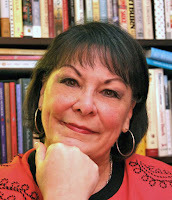 Pat Sabiston is originally from North Carolina where it is said that if you throw a rock—“nine out of ten times you’ll hit a writer.” However, Sabiston has made Panama City, Florida her home since 1992.
Pat Sabiston is originally from North Carolina where it is said that if you throw a rock—“nine out of ten times you’ll hit a writer.” However, Sabiston has made Panama City, Florida her home since 1992.Sabiston is a much sought-after trainer, motivator, and writing instructor. She has published books, essays, short stories, articles, fillers, and interviews. He work has appeared in the Atlanta Journal/Constitution, New York Times/Asbury Park Press edition, NPR Online, and The Southern Poetry Review among other outlets. She is a columnist for Bay Coastal Newspaper and is a journalist for GO! Christian Magazine. She is completing her first novel and published her first children’s book, CAN’T NEVER COULD, through WestBow Press, a division of Thomas Nelson/Zondervan.
As owner of The Write Place, a communications consulting firm, Pat’s daily routine is writing—advertising copy, newsletters, brochures, news releases, and grants. She also writes speeches and training curriculum.
Pat loves her Lord and Savior, Jesus Christ; her best friend, Tom; their children, grandchildren, and two GREAT grands; their Miniature Schnauzer, Dooley; and Crème Brulee.
https://www.facebook.com/pat.sabistonhttps://www.linkedin.com/in/pat-sabiston-bb03ba9/patsabiston@irawriter.comhttps://patsabistonauthor.com/
Published on May 29, 2025 22:00
May 28, 2025
A Healthy Perspective on Writing Contests

by Edie Melson @EdieMelson
It's that time of year again—writing conference season. With all the excitement of attending a conference also comes an attack of nerves for those who entered contests. Contests are fun and bring a lot of benefits, but they can also derail our progress if we give them too much power.
Tonight is the big night—we're announcing the winners for all our contests at the Blue Ridge Mountains Christian Writers Conference, so writing contests are on my mind. Over the past few weeks I’ve done everything from congratulate to commiserate with writers who entered, and it’s made me consider how I view contests—and how I should view contests.
It’s easy for me to be unbiased when it comes to this particular contest because I’m not allowed to enter it. My co-director, Edwina Perkins and I, along with contest director, Eva Marie Everson, set the contest up that way on purpose to protect the integrity of the judging.
Before you jump to any conclusions, NO Edwina and I don’t have anything to do with the judging for this contest. We really don’t have much to do with the contest at all. We leave that up to the amazing Eva Marie Everson. She does a fantastic job, including protecting this contest with the ferociousness of a she-wolf defending her young. And to be clear, she doesn’t do any of the judging either. She pulls in readers to give their honest opinions about the books entered. We don’t allow editors or agents or anyone else with connections to specific parts of the industry take part in the judging.
But readers are fickle—and opinionated. What one likes, another dislikes. And that is what’s at the heart of this post. Entering a writing contest isn’t like solving a math problem for the right answer, it’s subjective and unpredictable.
Enter the Not-So-Good Fact 1: Good books don’t always win. Sometimes they don’t even make the finalist list.
Fact 2: What we may consider as “poor books” sometimes make the finalist list, and they sometimes win.
Conclusion: Writing contests aren’t FAIR.
Now the TruthWriting contests aren’t fair. Yep I said it—and I’ll go one step further. Very little about the publishing world is fair. It’s a subjective industry full of unpredictable people. But just because a contest isn’t fair, doesn’t mean it doesn’t have value.
Let’s look at the concept of fairness. It’s something we learned about in Kindergarten and while it had purpose there, it pretty much skewed our perception of how things should be.
Truthfully, life isn’t fair.
So why enter a contest if it’s not going to give us a fair shot? But that’s another misconception. Contests really do give authors a pretty fair shot. We do everything we can to limit the biases and equal the playing field. But we’re part of a subjective industry, so the end results don’t always appear fair.
Look beyond winning and losing to find the value in entering writing contests.
Onto the GoodValue #1: Experience submitting your work without knowing the outcome. It’s good practice for submitting our work for publication.
Value #2: Visibility. Even if we don’t win, there are judges who see our work. Many contracts have come from a judge seeing a writer’s work—whether it won or not.
Value #3: The possibility of winning.
Acknowledging Frustrating EmotionsEntering a writing contest does engage our emotions, no matter how much we try to keep it from happening. There’s nothing wrong with getting excited when we win, or sad when we don’t. The important thing is to keep our perspective. Winning or not winning a contest won’t make or break us. Publishing is a journey. It has highs and lows, as well as easy times and difficult ones.
Publishing is also a career and/or ministry choice for many of us. When that’s the case, we need to remain professional in all our dealings. Calling out a contest and labeling it as unfair won’t change the system, but it will make us look petty and unprofessional. Rubbing a win in the faces of others has the same negative impact on our publishing goals.
Bottom LineGo ahead a take a chance and enter the contests that appeal to you. Increase the odds by following the directions exactly and make sure the contest you’re entering is a good fit for the writing you’ve done. Then sit back and enjoy the ride. Sometimes you win, sometimes you don’t, but good will come out of the experience, no matter what.
These are my thoughts on entering writing contests. I’d love to know yours. Be sure to leave a comment in the section below.
And don’t forget to join the conversation!Blessings, Edie
TWEETABLEA Healthy Perspective on Writing Contests from @EdieMelson (Click to Tweet)
 Edie Melson is a woman of faith with ink-stained fingers observing life through the lens of her camera. No matter whether she’s talking to writers, entrepreneurs, or readers, her first advice is always “Find your voice, live your story.” As an author, blogger, and speaker she’s encouraged and challenged audiences across the country and around the world. Her numerous books reflect her passion to help others develop the strength of their God-given gifts and apply them to their lives. Connect with her on her website, through Facebook, Twitter and Instagram.
Edie Melson is a woman of faith with ink-stained fingers observing life through the lens of her camera. No matter whether she’s talking to writers, entrepreneurs, or readers, her first advice is always “Find your voice, live your story.” As an author, blogger, and speaker she’s encouraged and challenged audiences across the country and around the world. Her numerous books reflect her passion to help others develop the strength of their God-given gifts and apply them to their lives. Connect with her on her website, through Facebook, Twitter and Instagram.
Published on May 28, 2025 22:00
May 27, 2025
Priorities for Today’s Writer
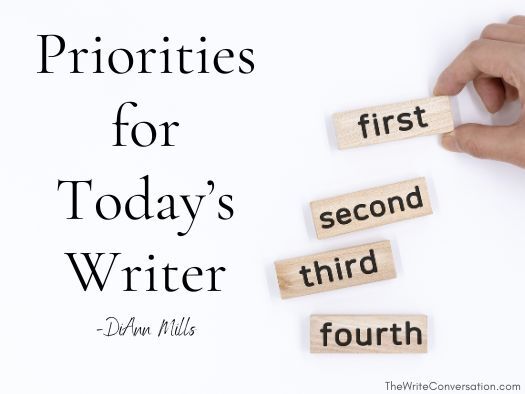
by DiAnn Mills @DiAnnMills
Do our priorities stop us from moving forward or do they propel us to success? Writers who juggle life and achieve little success with their commitments and goals often abandon their calling. The answer lies in understanding principles for organizing our lives.
Take inventory of what is important. Christians seek to place God on the top rung.
A Christ-Writer's Top 10 Priorities
1. Our relationship with the Author of creation must come first, or we’ll never experience peace or be fully satisfied with our lives.
2. Second should be our family. These are the people entrusted to our love and care. Life is about relationships, not how many books we’ve written or how many times we’ve hit the bestseller list. What counts is leaving a living legacy by showing our loved ones how much they mean to us through our faith in Jesus Christ.
3. Third is our day job. Writers often look forward to when they can write full-time. Before a writer makes that leap, ask these questions:Can I write outstanding manuscripts with the pressure of knowing that if the story doesn’t sell, my family won’t eat?Can I afford to buy medical insurance for my family without the benefits of a full-time position?Will I earn as much or more through writing than what my day job provides?
4. The fourth priority is our friends and our commitment to them. Ignoring friendships for the sake of reaching any goal is selfish. Balance is the key. Sometimes we need a non-writing friend to keep us sane.
5. Fifth comes our writing. Find the right time to write. This includes every aspect of working as a writer. Consider your schedule and responsibilities, then reserve a time. My pastor says, “Obey immediately.” That doesn’t mean we shake off our obligations until after we finish our blog. Our time may be at 4:00 a.m. before the household rises and begins the day. It may be after everyone goes to bed. It may be during a coffee break at work or brown bagging lunch so we can write at our desks.
6. Because writers are in the limelight, we must always look and act professionally. Whenever I walk to the mailbox, I look my best. Laugh if you must but think about neighbors or those driving by our houses or the UPS driver who all know we’re writers. Develop good habits that ensure we present ourselves appropriately. Our dress, makeup (if you’re a woman), and up-to-date hairstyle mean we’ve left an excellent impression.
7. Business cards are our introduction. Just as we greet others with a smile, so should our business card. Keep the card simple with your name and contact information and a professional photo.
8. Platforms are an important marketing tool. When we discover ours are weak, we explore expert assistance. We must have a website that expresses our genre and brand.
9. Post regularly on social media. Learn them and reach out to others. Choose which platforms work best to promote our brand and genre. But realize social media is about them, not us. Our social media platforms are not about selling books but about establishing relationships in which we help others according to our expertise.
10. Develop speaking abilities and techniques through professional organizations, or a college class. At first, we may be speaking for coffee and cookies, but we’re building a resumè. Create a blog in which the posts offer something to readers—and collect email addresses.
We are the ones who have accepted the challenge of reaching others through the power of the written word. Readers are waiting for us to pen the next word … and the next. Where will it take you?
TWEETABLEPriorities for Today's Writer from @DiAnnMills on @EdieMelson (Click to Tweet)
 DiAnn Mills is a bestselling author who believes her readers should expect an adventure. She creates action-packed, suspense-filled novels to thrill readers. Her titles have appeared on the CBA and ECPA bestseller lists; won two Christy Awards; and been finalists for the RITA, Daphne Du Maurier, Inspirational Readers’ Choice, and Carol award contests.
DiAnn Mills is a bestselling author who believes her readers should expect an adventure. She creates action-packed, suspense-filled novels to thrill readers. Her titles have appeared on the CBA and ECPA bestseller lists; won two Christy Awards; and been finalists for the RITA, Daphne Du Maurier, Inspirational Readers’ Choice, and Carol award contests. She is the former director of the Blue Ridge Mountain Christian Writers Conference, Mountainside Marketing Retreat, and Mountainside Novelist Retreat with social media specialist Edie Melson. Connect here: DIANNMILLS.COM
Published on May 27, 2025 22:00
May 26, 2025
Dipping the Quill Deeper: Humble Beginnings (Part 4)
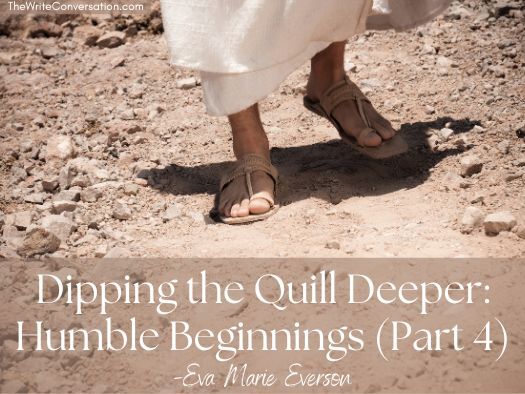
by Eva Marie Everson @EversonAuthor
Years ago, an agent within our industry—who at one time was a senior editor within this same industry—told a story that stuck with me.
I’d like to share it with you now.
In the late 1980s, Harvest House Publishers bestselling author, F. LaGard Smith, proposed a book on the topic of abortion . . . as much of a touchy subject then as it is now. Both the senior editor and the senior marketing guy told the authorthat the book was doomed to fail, but . . . being that the author was LaGard . . . they decided to take a chance on it.
As suspected, the book “tanked.”
Meanwhile, Somewhere in New York City
Meanwhile, somewhere in New York City, an unmarried actress and a married athlete found themselves in a relationship with each other. In time, the unmarried actress discovered that she was pregnant. Seeing as the father of the child was not going to leave his wife and seeing as how she didn’t want to rear the child on her own (or bring any additional shame), she decided to have an abortion. She didn’t want to have the abortion in the city where someone might see and recognize her, so she decided to fly to California where friends could help her with both finding the right clinic and with anonymity.
At the appointed time, she flew from New York to California, her seat in first class.
Shortly after takeoff, she noticed a book in the seatback pocket (where—back in the day—one could find magazines in addition to the barf bag). Bored, she pulled the book out and—as you may have guessed—it was LaGard’s When Choice Becomes God.
She read throughout the entire flight. By the time she landed, she had decided not to have an abortion but to, instead, give birth to and keep her child.
Back to New York
After returning to New York, the actress called Harvest House to ask for LaGard’s phone number. Typically, the receptionist would never give out phone numbers, or any contact information for that matter. But on that day, the receptionist was out sick, so a temp (who didn’t know the rules) sat at her desk answering calls. After receiving the request, she looked up the author’s contact information and happily gave it to the actress.
The new mother-to-be then placed a call to LaGard’s residence, which happened to be in England. Because of the time change, her call woke the author up from a good night’s sleep. But graciously, LaGard chatted with the woman, listened to her story, and then, remarkably, led her to Christ.
Meanwhile, Back at Harvest House
“The reason I told the story,” the senior editor told me recently when I asked him for the finer details, “was to remind writers—or anyone, really—that God isn’t interested in our success so much as our obedience. We told LaGard the book wouldn’t sell much, and it didn’t. But there is one person alive today because he wrote—and we published—that book.”
And, might I add, who but God alone knows who that one person has become or what that one person has done. After all, both Moses and Jesus were little babies who “got away” from a massacre.
This is another example of a humble beginning.
Are you writing what God is calling you to write or what you think will sell? Are you writing for financial success or for what God sees as successful? Are you writing for the masses or for, perhaps, that one life?
Don't Miss the Other Posts in this Series! HUMBLE BEGINNINGS, PART 1 HUMBLER BEGINNINGS, PART 2 HUMBLE BEGINNINGS, PART 3 HUMBLE BEGINNINGS, PART 4
TWEETABLEDipping the Quill Deeper: Humble Beginnings (Part 4) from @EversonAuthor on @EdieMelson (Click to Tweet)
 Eva Marie Everson is the CEO of Word Weavers International, the director of Florida Christian Writers Conference, and the contest director for the Blue Ridge Mountains Christian Writers Conference. She is the author of almost 50 books, both fiction and nonfiction. Her next novel, Beth Bettencourt, is set for release in 2026 (Kregel). To know more about Eva Marie (or to be added to her Southern newsletter), you can connect with her at www.EvaMarieEversonAuthor.com
Eva Marie Everson is the CEO of Word Weavers International, the director of Florida Christian Writers Conference, and the contest director for the Blue Ridge Mountains Christian Writers Conference. She is the author of almost 50 books, both fiction and nonfiction. Her next novel, Beth Bettencourt, is set for release in 2026 (Kregel). To know more about Eva Marie (or to be added to her Southern newsletter), you can connect with her at www.EvaMarieEversonAuthor.com
Published on May 26, 2025 22:00
May 25, 2025
The Answer to Your Writing Struggles is Blowin' in the Wind
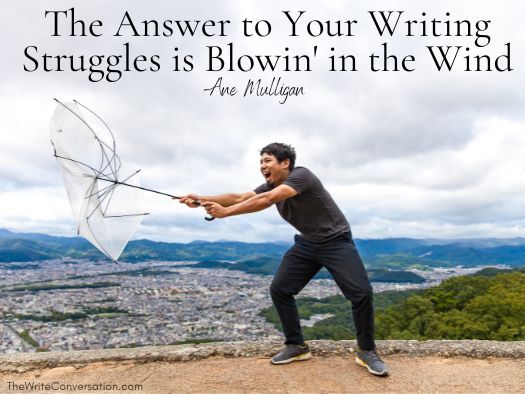
by Ane Mulligan @AneMulligan
One day, it was windy here in Sugar Hill. Really windy. I had asked my music minister to pick up a 4'x8' sheet of closed-cell Styrofoam and some lumber at Home Depot to make a stage prop for a drama production. After all, he's the one who asked me to build the prop, and he had the pick-up truck.
Closed-cell Styrofoam, for those who don't know, is used in building houses. It's great for lightweight sets and props. I told him he could wait until next week, so don't blame me.
He's the one who decided to pick it up on Thursday. In the wind.
Have you ever walked with a large sheet of closed-cell Styrofoam? It's bad enough with no wind. When holding a sheet, it can act like a sail. That stuff could carry a 150-pound man to Savannah and back.
Coming out of the store, he was buffeted by the wind, which turned him around a number of times. By sheer grit, he managed to hold on to it and make his way to his truck with his feet still on the ground.
Then he had to tie it down. While this was going on, he picked up an audience in the parking lot.
Each time he let go of one side to grab the tie-down, the other side made lift-off, nearly taking him with it. Trying to remain rooted to the ground and tie down the sheet to his truck was proving impossible.
Finally, a few guys, with tears of laughter streaming down their faces, helped him. But the minute they got it tied down, everything else in the back of the truck blew out ... all over the parking lot.
I have to confess. The next morning at church, I couldn't help myself. When he walked past me, I started singing I'll Fly Away.
I wonder who I can ask to help me build the next prop?
So what does this have to do with writing?
A lot actually. When you're struggling to nail your plot without holes in it, try a brainstorm session with a critique partner or friend. I've even made my husband and youngest son come up with ideas for me. And they are truly great with them—sometimes.
While family is great, there are none better than your close writing buddies. I've been CPs with mine for close to 20 years. They know my writing voice and can suggest ideas that suit my stories.
But what if you're a new writer without writing buddies? Look for some online. There are so many writer communities in cyberspace. If you want a specific genre writing community, Google it. A Christian one—Googel it. One that meets in person—you know what I'm going to say. Google it.
And when you do, you will find the people who—like those guys int he parking lot—will come along side you and help you on your journey.
So, join the conversation: How did you meet your writing buddies or critique partners?
TWEETABLEThe Answer to Your Writing Struggles is Blowin' in the Wind from @AneMulligan on @EdieMelson (Click to Tweet)
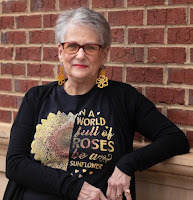 Ane Mulligan lives life from a director’s chair, both in theatre and at her desk creating novels. Entranced with story by age three, at five she saw PETER PAN onstage and was struck with a fever from which she never recovered—stage fever. One day, her passions collided, and an award-winning, bestselling novelist emerged. She believes chocolate and coffee are two of the four major food groups and lives in Sugar Hill, GA, with her artist husband and a rascally Rottweiler. Find Ane on her website, Amazon Author page, Facebook, Instagram, Pinterest, The Write Conversation, and Blue Ridge Conference Blog.
Ane Mulligan lives life from a director’s chair, both in theatre and at her desk creating novels. Entranced with story by age three, at five she saw PETER PAN onstage and was struck with a fever from which she never recovered—stage fever. One day, her passions collided, and an award-winning, bestselling novelist emerged. She believes chocolate and coffee are two of the four major food groups and lives in Sugar Hill, GA, with her artist husband and a rascally Rottweiler. Find Ane on her website, Amazon Author page, Facebook, Instagram, Pinterest, The Write Conversation, and Blue Ridge Conference Blog.
Published on May 25, 2025 22:00



